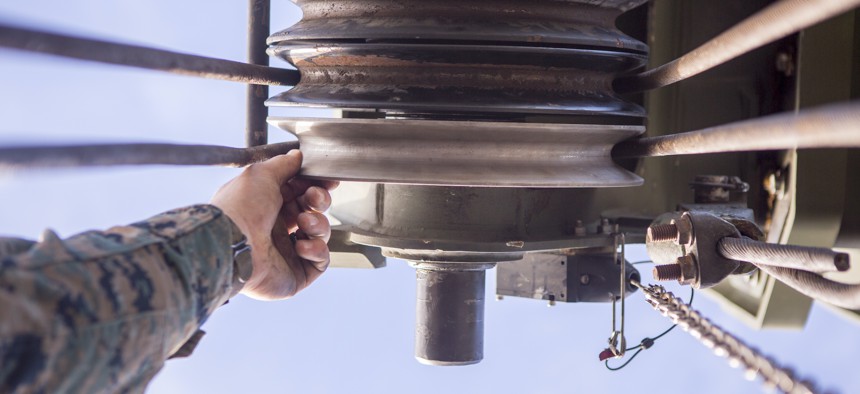Boeing, Northrop Grumman join group pushing 3D printing to small suppliers

U.S. Marine Sgt. Stephen Southard adjusts a 3D-printed sheave during a load test at Marine Corps Base Camp Pendleton, California, Jan. 24, 2019. U.S. Marine Corps / Cpl. L. Ruth Wheeley
The White House-backed compact is also part of an effort to make supply chains more resilient.
Boeing and Northrop Grumman have joined a White House-backed consortium that is pushing smaller aerospace and defense suppliers to manufacture more 3D-printed parts.
The companies join Lockheed Martin, Raytheon Technologies, GE, Siemens, and Honeywell as members of the AM Forward group that the Biden administration announced in May.
“While U.S. manufacturing is making a comeback, not enough American companies are adopting 3D printing or other high-performance advanced manufacturing technologies, which have the power to transform shop floors across the country and improve suppliers’ global competitiveness,” ASTRO America, the nonprofit organization that runs AM Forward, said in a Wednesday statement.
Pentagon leaders spanning three presidential administrations have pushed the military and defense companies to expand their use of 3D-printed parts in weapons and equipment. The technology could allow troops to more easily and quickly repair or even replace weapons on the battlefield without large supply depots.
“Through AM Forward, each of these major U.S. companies make clear, public commitments to purchase additively produced parts from smaller U.S.-based suppliers; train the workers of their suppliers on new additive technologies; provide detailed technical assistance to support their suppliers’ adoption of new capabilities; and engage in development of common standards and certification for additive products,” the group said in a statement.
3D printing, also known as additive manufacturing, is used by several high-profile space and rocket startups. The technology could allow companies to quickly build rockets, drones, and satellites.
The coronavirus pandemic and supply-chain woes that followed have prompted companies—and Biden administration officials—to look to 3D printing.
“The supply chain crisis isn’t just about improving our ports. It’s also about innovating shop floors—right here in America’s small business factories,” said STRO America President Neal Orringer.


